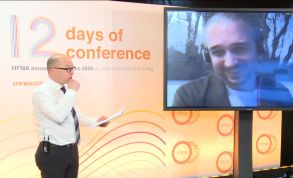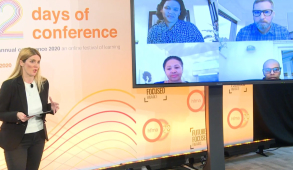HFMA 2020: leaders urged to ‘listen to quietest voice’
 Daniele Fiandaca (pictured), co-founder of Utopia and Token Man, businesses that seek to help organisations become more inclusive, told the conference that it was better to start with inclusion, and work with organisations’ leaders to fill gaps in their understanding.
Daniele Fiandaca (pictured), co-founder of Utopia and Token Man, businesses that seek to help organisations become more inclusive, told the conference that it was better to start with inclusion, and work with organisations’ leaders to fill gaps in their understanding.
‘When we go into organisations, one thing we do is tell people to listen to the quietest voice in the room. Listen to the people who aren’t speaking and find out what they are truly feeling.
‘The thing that makes me positive about the future is that once you start filling the ignorance gap and they understand the behaviours that exclude certain people on a daily basis, people start to change.’
Initially, this can appear to be the wrong approach – one firm he had worked with on inclusion saw a spike in the number of complaints from its black employees. But he said such a result showed the employees had become more ‘comfortable talking about the frustrations they had faced throughout their careers’. ‘It allowed the business to see that it needed to start addressing these issues,’ he added.
Panellists at a Future-Focused Finance inclusion and diversity session during Monday’s conference (pictured below) were asked what single measure they would implement to deliver a more diverse leadership that more closely reflected the community. Edward John, Frimley Health NHS Foundation Trust director of operational finance and Future-Focused Finance diversity lead, said he would introduce stricter reporting requirements.
‘I would make equality, diversity and inclusion (EDI) statistics and the progress of action plans mandatory reporting on a monthly basis,’ he said. ‘We are always working to make changes, and all believe in the benefits and nature of EDI, but the day job seems to get in the way.’
Too often the topic fell into the important, but not urgent category – meaning pace of change was slower than it should be, he added. ‘We are changing, but it is too slow for my liking.’
 Jonathan Stephens, finance director for NHS England and NHS Improvement’s North West region, also backed making finance directors and chief finance officers accountable for diversity and inclusion targets in their departments. ‘Unless we set some targets, sometimes these things take a lot longer to get moved along,’ he said.
Jonathan Stephens, finance director for NHS England and NHS Improvement’s North West region, also backed making finance directors and chief finance officers accountable for diversity and inclusion targets in their departments. ‘Unless we set some targets, sometimes these things take a lot longer to get moved along,’ he said.
While the ultimate target was wanting more finance directors from a diverse background, there were a number of steps that needed to be achieved first. ‘If you look at the pipeline, we’ve not got enough diversity at deputy level so what we need are some practical things as well as targets to help senior finance leaders achieve this,’ he said.
The panel was also asked about what other opportunities should be on offer to improve inclusion. Natasha Munro, a financial planning manager at NHS England and NHS Improvement, has been on a sponsorship programme. She said this had helped her to think through how her career might progress and given her opportunities she wouldn’t have had outside the programme. She said more sponsees should be encouraged to come forward for this programme.
But she added that there was also a role for managers to have specific, direct conversations. ‘If you have a band 7 who has been a band 7 for three years, we need to understand what is happening,’ she said. ‘Is that because of a choice or are there other barriers that need to be removed?’
Donna Shade, divisional head of finance at United Lincolnshire Hospitals NHS Trust, agreed that direct conversations and identifying the diverse population within teams were both important. ‘But we also need to make sure that teams are aware of the training and the information that is available, like the sponsorship programme and the Breaking Diversity Barriers course,’ she said.
Mr Stephens said that more needed to be done to market NHS finance as a career. He said that if people thought about a career in the NHS they thought about doctors and nurses – many were simply not aware of the range of opportunities. ‘So one of our workstreams is looking at how do we get out to schools, colleges, universities but also some of the more deprived areas,’ he said.
Related content
We are excited to bring you a fun packed Eastern Branch Conference in 2025 over three days.
This event is for those that will benefit from an overview of costing in the NHS or those new to costing and will cover why we cost and the processes.